Home repairs and renovations can quickly accumulate to significant expenses, prompting many homeowners to search for ways to economize on their projects. According to recent findings by Clever Real Estate, nearly one-third of homeowners may consider hiring contractors with dubious histories to save on costs. This willingness to compromise standards highlights a crucial dilemma faced by homeowners: how to balance fiscal constraints with the need for quality work. While the allure of a lower price tag is undeniable, the risks associated with hiring a contractor who lacks a sturdy reputation could lead to more substantial costs in the long run.
The report from Clever, which surveyed 1,000 homeowners in mid-August, uncovered that reputation is a primary factor influencing contractor selection, ranked by 25% of respondents. Nevertheless, a notable 33% would prioritize cost over the contractor’s credibility, indicating a concerning trend of valuing immediate savings potentially at the expense of long-term satisfaction and safety.
The Pitfalls of Cutting Corners with Contractors
Experts assert that opting for a contractor with a questionable background is a gamble fraught with consequences. Jamie Dunaway-Seale, the author of the Clever report, describes these problematic contractors as those who may provide inaccurate price estimates, exaggerate their skills, deliver subpar results, or simply fail to fulfill their obligations altogether. Angi co-founder Angie Hicks emphasizes the importance of prioritizing reliability over cost savings, suggesting that newcomers in the industry might be more trustworthy than those with checkered pasts.
The threat of contractor fraud is particularly pronounced during recovery efforts following natural disasters. Loretta Worters from the Insurance Information Institute warns that unscrupulous individuals often exploit the vulnerabilities of homeowners eager to restore their properties. In the wake of disasters like Hurricane Milton, which threatens record-breaking chaos along Florida’s coast, it’s vital for homeowners to remain vigilant against potential scams and not allow their desperation to lead to further misfortune.
In situations where homeowners face the aftermath of storm damage, it’s imperative to be thorough when selecting contractors. Engaging with a reliable and certified professional not only builds trust but also protects against falling victim to fraud. Experts recommend a proactive approach to researching contractors and verifying their credentials.
Advice from industry professionals suggests that homeowners should commence their search by checking the contractor’s reputation. Seeking personal recommendations from connections who have previously hired contractors can provide an initial layer of security. Additionally, online reviews can shed light on the contractor’s reliability and quality of work. When receiving estimates, it’s crucial to follow up with references to gain insights into the contractor’s work ethic and professionalism.
Assessing Credentials and Insurance: An Essential Step
A contractor’s licensing and insurance status should be considered non-negotiable prerequisites for any home improvement project. While licensing isn’t mandated in every state, hiring contractors in regions that require it ensures a level of oversight and accountability. All reputable contractors should possess insurance that protects homeowners from potential liabilities arising from work mishaps.
Early interactions with potential contractors can offer invaluable clues about their operation style. Homeowners should observe whether the contractor is providing detailed estimates in writing and outlining payment structures clearly. Hicks notes that upfront payments shouldn’t surpass 10% or 20% of the total project cost, as inflated deposits can be indicative of fraud.
To foster informed decision-making, homeowners should acquire at least two or three estimates before settling on a contractor. This practice not only clarifies pricing norms but also instills an understanding of the project’s financial dynamics. Hicks cautions against deals that appear too favorable; a common adage holds true here: if something seems too good to be true, it probably is.
Furthermore, it’s essential for homeowners to construct a clear delineation between aspirations and expectations when embarking on home renovations. Transparency, reputable credentials, and comprehensive insurance should always take precedence over saving a few dollars. When homeowners safeguard themselves by making informed choices, they reduce the likelihood of experiencing the pitfalls of untrustworthy contracting work, ensuring their renovation projects culminate in enduring satisfaction.

